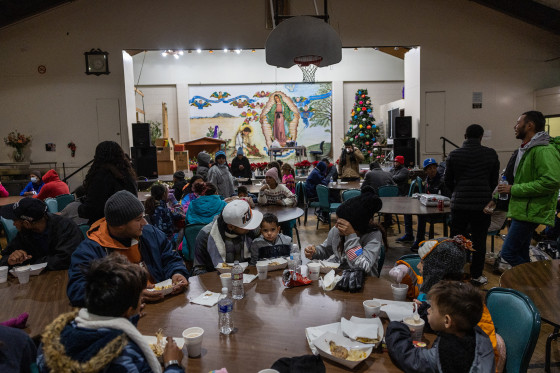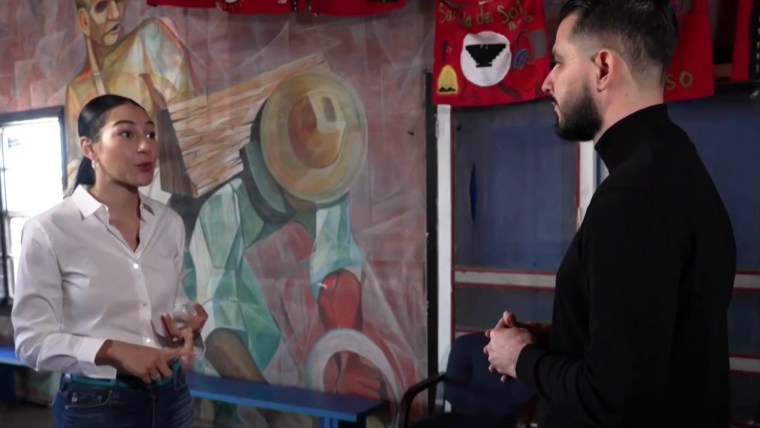Immigrants' rights advocates are helping vulnerable families prepare plans of action in case an undocumented relative is suddenly detained or deported.

Advocates and groups are conducting know-your-rights training sessions and helping vulnerable families prepare plans of action in case an undocumented relative is suddenly detained or deported. John Moore / Getty Images file
Dec. 23, 2024, 4:56 PM EST
By Nicole Acevedo
Immigrant families are spending the holidays having difficult conversations in anticipation of President-elect Donald Trump’s plan to carry out what he has called “the largest deportation program in American history” once he's sworn in next month.
“A lot of us are honestly celebrating Christmas together thinking, ‘Oh my God, is this the last time we get to spend Christmas with our family members?’” said Felipe Sousa-Lazaballet, who leads the Hope CommUnity Center, a nonprofit organization outside of Orlando, Florida, that advocates for immigrants and other underserved communities. "This is really heart-wrenching."
To deliver on Trump's promise to deport more than 11 million undocumented immigrants, the incoming administration intends to roll back policies that restrict immigration enforcement actions in sensitive places like schools, churches and hospitals, as well as their respective surrounding areas, NBC News reported.
"There’s no way they can deport millions of people if they don’t go for the low-hanging fruit, and this is it,” Sousa-Lazaballet said.
NBC News spoke with nearly a half-dozen immigrants' rights advocates across four states, and they all said they have received an increased number of calls from immigrants asking about their rights. They have also heard questions from community groups, schools and churches about what their roles are in the face of such possibilities.
In response, the advocates and groups are conducting know-your-rights trainings and helping vulnerable families prepare plans of action in case an undocumented relative is suddenly detained or deported.
Dec. 23, 2024, 4:56 PM EST
By Nicole Acevedo
Immigrant families are spending the holidays having difficult conversations in anticipation of President-elect Donald Trump’s plan to carry out what he has called “the largest deportation program in American history” once he's sworn in next month.
“A lot of us are honestly celebrating Christmas together thinking, ‘Oh my God, is this the last time we get to spend Christmas with our family members?’” said Felipe Sousa-Lazaballet, who leads the Hope CommUnity Center, a nonprofit organization outside of Orlando, Florida, that advocates for immigrants and other underserved communities. "This is really heart-wrenching."
To deliver on Trump's promise to deport more than 11 million undocumented immigrants, the incoming administration intends to roll back policies that restrict immigration enforcement actions in sensitive places like schools, churches and hospitals, as well as their respective surrounding areas, NBC News reported.
"There’s no way they can deport millions of people if they don’t go for the low-hanging fruit, and this is it,” Sousa-Lazaballet said.
NBC News spoke with nearly a half-dozen immigrants' rights advocates across four states, and they all said they have received an increased number of calls from immigrants asking about their rights. They have also heard questions from community groups, schools and churches about what their roles are in the face of such possibilities.
In response, the advocates and groups are conducting know-your-rights trainings and helping vulnerable families prepare plans of action in case an undocumented relative is suddenly detained or deported.

Conflicting messages, open questions in border communities after Trump win
11:47
In Texas, a new law requiring some hospitals to ask patients about their immigration status is starting to "push folks further into the shadows," showing a glimpse into what happens when sensitive locations become targets of immigration enforcement, said Javier Hidalgo, legal director of RAICES, a nonprofit group in San Antonio that advocates for refugees and immigrants.
Texas has become a model for immigration crackdown, Hidalgo said, but that has also motivated advocates and nonprofits to provide tools and resources to affected families to curb the detrimental effects of detentions and deportations. These stand to impact nearly 5.8 million U.S. households, in which at least one relative is undocumented.
Like Texas, Florida will also "see the brunt" of Trump's immigration policies sooner than other states, since Gov. Ron DeSantis has shown himself to be an ally in advancing the incoming president’s agenda, Sousa-Lazaballet said.
Similar to what Hidalgo is doing in Texas, Sousa-Lazaballet in Florida has been facilitating thousands of difficult, but necessary, conversations to ensure immigrant families have a "dignity plan" in place.
The plan includes redacting power-of-attorney documents or a guardianship that outlines who will take care of the children left behind if an undocumented parent is picked up by immigration authorities. Sousa-Lazaballet said this ensures parents don't lose custody of their children to the Department of Families and Children simply because they never made it home after being detained or deported.
In Phoenix, Arizona, Jose Patiño, vice president of education and external affairs at Aliento, an advocacy organization, is doing the same with its "family packets." Patiño said it's important for families to sort out legal guardianship over any of their properties and financial accounts to ensure the relatives left behind can access them if the main breadwinner is detained or deported.
In Sousa-Lazaballet’s experience, the first 30 to 45 minutes of these kinds of conversations are “of just crying, sobbing, and us trying to get people back enough to their senses” to craft the plan they need.
While preparing for the worst is important, the process also takes an unmeasurable mental health toll on both adults and children in immigrant families as they attempt to continue living through their daily routines, Patiño, Hidalgo and Sousa-Lazaballet said.
RAICES, the largest immigration legal services provider in Texas and a leading refugee resettlement agency, has said it's "ready to challenge any presidential actions that threaten equitable access to the legal and human right to seek safety in the U.S."
If the policy restricting immigration enforcement actions on sensitive locations is rescinded, depending on how the Trump administration executes that, there may be legal ground for a challenge, Hidalgo said. Until then, the organization will remain vigilant.
The Coalition for Humane Immigrant Rights in Los Angeles plans to do the same, said Jorge-Mario Cabrera, its director of communications.
Over the past month, the coalition offered 93 know-your-rights presentations at L.A. schools, businesses and organizations that provide community services. As Inauguration Day approaches, Cabrera said he anticipates the demand for these kinds of trainings to increase.
U.S. Immigration and Customs Enforcement "does not have jurisdiction over our lives, the Constitution does, and we are protected regardless of our immigration status," Cabrera said.
Trump plans to lift restriction on ICE arrests at churches, schools and hospitals
02:28
On Jan. 20, United We Dream, the nation’s largest immigrant youth-led network, plans to reopen the hotline they launched during Trump's first term as president, said Anabel Mendoza, the organization's interim director of communications.
Mendoza said the hotline will provide support to immigrants and anyone affected by immigration enforcement actions in the coming year.
"No one will be immune to feeling the ramifications and consequences of mass deportations. It affects everybody," she said. That's why United We Dream is also urging elected officials at all government levels to "stand with immigrants," but most importantly to take "concrete and tangible actions that put up barriers to what we know Trump is planning."
That, alongside "massive public pressure," would be key to ensuring that immigration enforcement tactics that "go against American values" don't become the new normal, Patiño said.
In the meantime, Patiño said he is advising undocumented immigrants, especially young ones, to get legal screenings to find out if they are eligible for any kind of relief that may put them on a path to get legal immigration status.
For those who are already in that process, Hidalgo recommends they always have their immigration paperwork up to date and carry the documents with them in case of an encounter with an immigration enforcement officer.
No comments:
Post a Comment